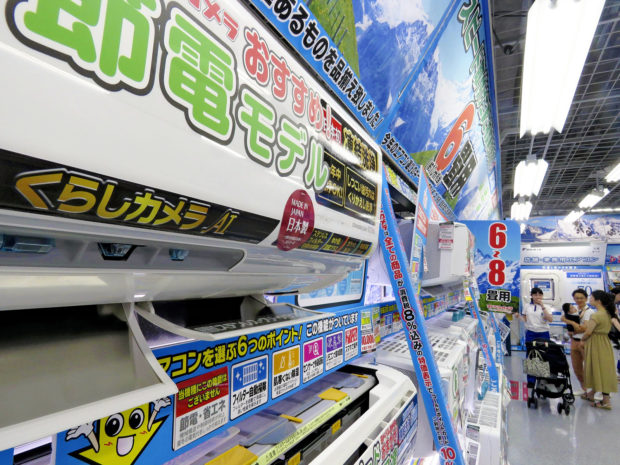TOKYO — The ongoing heat wave has boosted sluggish consumer spending, with sales of air conditioners, beer, ice cream and other popular summer items on the rise.
Much attention will be paid to how great a lift consumption will receive.
According to major home appliance retailer Bic Camera Inc., sales of air conditioners rose 20 percent in June from the same period last year. The trend has continued into July, largely due to the early end to the rainy season in the Kanto and Koshin regions on June 29 and the ongoing heat wave affecting both regions.
As the fierce heat is expected to continue into the summer, Daikin Industries, Ltd. plans to increase production of air conditioners from July to September by 10 percent over the same period last year.
The special functions of various manufacturers’ air conditioners have contributed to strong unit sales. One type, for example, uses artificial intelligence to adjust air direction and volume based on changes in the “feels like” temperature.
At convenience stores run by Lawson, Inc., products such as cold noodles, ice cream and antiperspirant spray are selling well. Sales of such products in the Kanto region from July 9 to 15 rose by 5 to 10 percent from the same period last year.
Frozen sweets are also popular. According to Akagi Nyugyo Co., which manufactures the famous GariGarikun popsicle, its shipping volume across a span of several days in July increased by 30 to 40 percent from the same period last year.
Kirin Co. plans to increase the output of beer, including low-malt versions, in late July by about 20 percent more than the previous year, ramping up production at its factories nationwide to full capacity.
Suntory Spirits Ltd. also plans to increase production of chuhai and whiskey-and-soda highballs by 15 percent in July and August.
The Dai-ichi Life Research Institute Inc. estimates Japan’s gross domestic product will increase by about ¥300 billion if daylight hours in July to September are the same as in 2010, when summer was extraordinarily hot across the country.
However, if spending increases due to the heat wave, it is feared that people will cut back on expenditures from the beginning of autumn.
